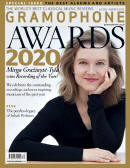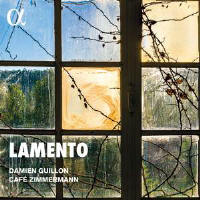Texte paru dans: / Appeared in: |
|
 |
Outil de traduction (Très approximatif) |
|
Reviewer:
Lindsay Kemp There are so many riches to be had from 17th-century German and Austrian string-band music and this release mines them movingly. Seventy minutes with Death for company may look like hard going but such is the expressive depth and profound consoling beauty of the works assembled here, and so committed and responsive the performances, that it compels the attention. Before you know it, it’s over, leaving your melancholy soul aglow. Among the more familiar ensemble pieces are Schmelzer’s Lamento on the death of Emperor Ferdinand III and Johann Christoph Bach’s outpouring of penitential sorrowing, Ach, dass ich Wassers gnug hätte. The Schmelzer is a superb exercise in wordless expression and Café Zimmermann’s playing engages fully in the rhetoric, from dignified mourning to ominous tolling bell effects to passionate flare-ups (even the ornamentation serves to heighten the outrage). The Bach is a restless, almost disturbing melding of sophisticated declamation and striking musical imagery. Also much recorded is the work that closes the programme in meditative repetition, the solo violin Passacaglia from Biber’s Mystery Sonatas, sleekly set out by Pablo Valetti at a swiftish pace that causes the virtuoso flourishes to cut loose impulsively from the recurring bars in which only the fournote bass sounds, like a faint but unflagging heartbeat. The less well-known pieces here include a piece written for Carnival by Schmelzer that ironically echoes the style of the Lamento; Café Zimmermann point the dance rhythms so sharply that the short notes are sometimes barely there, yet still have their full effect. The playing is no less vigorous in a suite from Biber’s 1680 Mensa sonora, while the vocal pieces include a dignified funeral psalm by Johann Michael Bach, a moody little pledge of faith by Christoph Bernhard and a spacious Latin motet that is technically anonymous but whose inventive solo violin glosses signal no other hand than Biber’s. A Froberger keyboard Toccata (on organ) followed by a gently drawn-out Ricercar (transferred to strings) completes the programme. I have mentioned the excellence of Café Zimmermann’s playing – rich, gutty and intimately felt. But high commendation must also go to Damien Guillon, a countertenor whose voice is not of the operatic type but high-lying, expressive, fluid and focused, with a pleasing tendency to warm the ends of phrases – just right for this job. This is a release you will want to listen to over and over again for its beauty, but perhaps also for its power to heal. |
|




